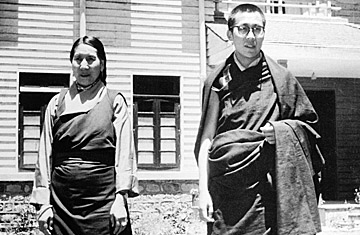
May 28, 1959: Tenzin Gyatso, the 14th Dalai Lama, and his mother, shortly after the Tibetan Buddhist ruler fled his homeland for exile in northern India
(7 of 9)
Journey to Peking. Returning to Lhasa, the 17-year-old Dalai Lama received the Red emissaries with frank curiosity. Much of what they proposed—schools, roads, hospitals, light industry—met his approval. Many Tibetans welcomed the break with the feudal past, argued: "We must learn modern methods from someone—why not the Chinese?" The Dalai Lama made a six-month visit to Mao Tse-tung's new China, listened patiently to lectures on Marxism and Leninism, saw factories, dams, parades. Back in Tibet, Red technicians set to work. Some 3,000 Tibetan students were shipped off to school in Red China. But things went wrong from the start. The hard-driving Red cadres filled with Communist zeal made little impression on the individualistic Tibetans, who felt that the inner perfection of a man's soul was more important than an asphalt surface on a road. Sighed the Dalai Lama: "China and Tibet are like fire and wood."
His words were proved true in the border province of Kham, where the Reds had been longer in control. The lamaseries of Kham were looted of their treasure and their land collectivized. Nomad Khamba tribesmen were driven from the pastureland they had used for centuries. Tribal chiefs resented their loss of power te the commissars. The Khambas, great shaggy men often 6 ft. tall, with leather boots, 3-ft. swords and rifles they are born and die with, fought back. Snipers bushwhacked lone Red couriers on the new road to Lhasa. Khamba bands ambushed military convoys. The embittered monks drove off the Chinese farmers sent to take over their land. To teach them a lesson. the Chinese Reds sent bombing planes and leveled the intransigent lamaseries.
For four years the guerrilla war raged along the border. More and more dispossessed Khambas crossed over into Tibet proper and roused their fellow tribesmen in the Tsangpo valley to join the revolt. In Lhasa, monks grumbled at the religion-destroying teachings of the Red Chinese; Tibetans complained at soaring prices and the confiscation of grain and wool. The Reds applied pressure on the Dalai Lama to quiet his people. To an anxious crowd assembled in the Norbulingka gardens, the God-King said blandly: "If the Chinese Communists have come to Tibet to help us, it is most important that they should respect our social system, culture, customs and habits. If Chinese Communists do not understand the conditions and harm or injure our people, you should immediately report the facts to the government, and we can immediately ask that the guilty ones be sent back to China."
When the rebel Khamba tribesmen began attacking Red outposts within 40 miles of Lhasa, the Red commander demanded that the Dalai Lama prove his "solidarity" by ordering his 5,000-man bodyguard against the rebels. It was a shrewd move, for in the past Lhasa had had its own troubles with the Khambas, who recognized the spiritual rule of the Dalai Lama but had a habit of killing his tax gatherers and robbing caravans. The God-King solved it neatly: he sent a message to the Khambas saying cryptically that "bloodshed was not the answer," but flatly refused to lend Tibetan troops on a punitive expedition.
